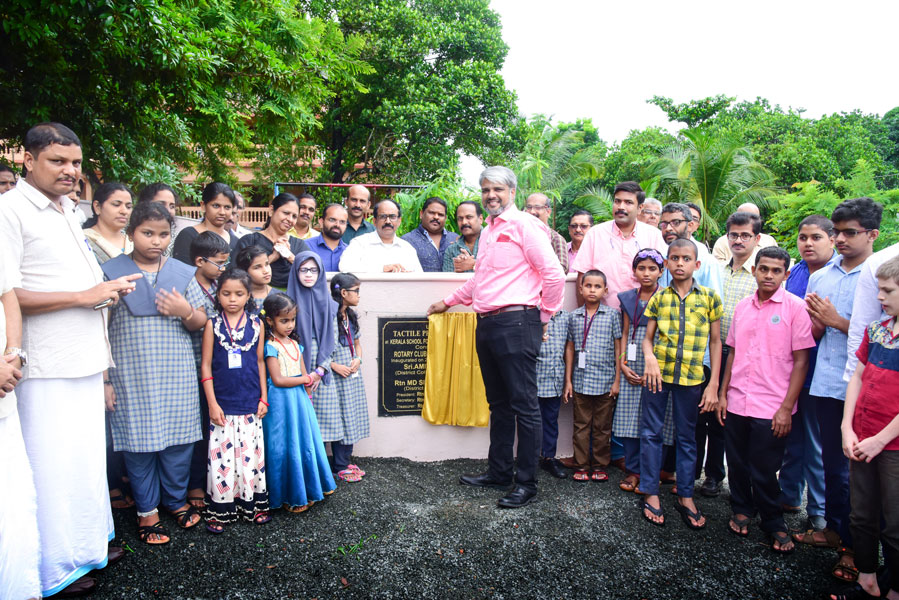This park in Mankada, a hillside village in Kerala, is quite different from regular parks. Along with all the play equipment, the park is also equipped with abacus apparatus on its wall, and the compound wall has geometric shapes, mathematical operations and equations, as also the maps of the local region Mallapuram, India and the world, in braille. It is a ‘tactile pedagogy park’ specially designed by the Rotarians of Rotary Club of Manjeri, D 3202, for visually-challenged.

Why should the differently-abled be any different from a normal child and why can’t a visually-impaired child enjoy the open air and feel the breeze on her face as she goes up a swing, and also learn mathematics, geography and more, asks Club President Dr M J Sujith, elaborating on the features of the special park.
The genesis for the park began when the Rotarians brainstormed various learning methods with the teachers at a school for visually-challenged in the town. This school was an initiative of Chandrasekaran Nair, a war veteran who lost his eyesight in a shell explosion. He was given special training by the Army to enable him to spend his life purposefully. On his return to his hometown, Nair came up with this school which now has 83 visually-impaired students. “He is always on the lookout for new ideas and tools that will make learning easy and purposeful for the blind. When we discussed this idea of a special park which includes a play-way method of learning, Nair was totally interested and gave us several inputs while working on the park,” says Sujith.
The park, designed by Abdulla, a new generation architect, is an uncluttered, open space, big enough for children to move around comfortably; the flooring is textured uniquely so that they can ‘feel’ the shapes, sand and pebbles under their feet. “The entire idea was so distinct and interesting that it drew all the members of the club in one way or the other. They came up with different ideas even when the construction was underway and we reworked on some of them. Our motive was to give the best to these children and help them appreciate the world through the rest of their sense organs,” he says. A special committee headed by M S Seshan monitored the construction and executed the novel ideas. The total cost, ₹4.5 lakh, was met with contribution from members and some generous philanthropists.
School Principal Yashir, excited about the concept park, says that it has benefitted the teachers much more as the classes have become livelier after visits to the park everyday. The children understand the concepts better, touching and feeling the models, and later discussing their learning in the classrooms.
Loss of sight does not stop these children from dreaming big. Haroon Karim for instance, a partially blind student studying in Class 9 in this school, dreams of becoming a computer engineer. “You must see his fingers move deftly across the keyboard. He has a YouTube channel of his own. Like him, each of these children are gifted and we are happy that Rotary has given us the means to do something in our own small way to enrich their knowledge,” says Bharat Das, the Project Contact.
The park was inaugurated in June by the then DG P M Sivashankaran. It has become so popular in the region that the club is flooded with enquiries for replicating it in other areas. The Kerala State Council for Education and Research has acknowledged it as an innovative project, while the Directorate of Education and Training ranks it as one of the three best innovative training methodology, says Das.
The club has earlier provided electric wiring, drinking water facilities and computers specially designed by the IIT, Chennai, and an audio library for the school with the support of a matching grant from TRF and RC Orlando, Canada. Two more projects — a swimming pool and providing Kindle tabs for the children — are being planned by the club for the school.






